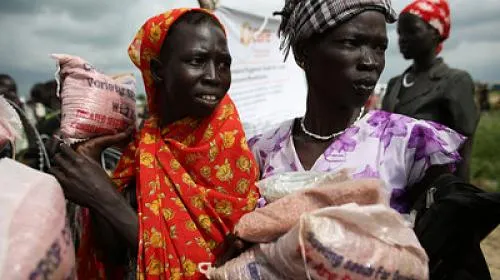JUBA, South Sudan—(April 26, 2016)– As a key part of a peace agreement signed in August 2015, opposition leader Riek Machar has returned to South Sudan, which could bring the long-awaited Transitional Government of National Unity. This is significant progress towards lasting peace and development for the people of South Sudan, but both parties must stay committed to this critical step in the peace process, as the fate of South Sudan is in jeopardy, says humanitarian agency CARE.
“We hope the return of Machar will quickly lead to the transitional government. This will pave the way for not only lasting peace, but also a new and prosperous South Sudan. Funding the country was using on the conflict can now be used to build back the economy and educate the children,” said Fred McCray, CARE Country Director in South Sudan. “As a country rich in natural resources, South Sudan has an opportunity to take its place among the leading countries in East Africa and turn its current suffering into success.”
The return of Machar comes at a time when humanitarian needs are extremely dire, especially for women and girls. Due to lack of food, nearly one in every three pregnant women and lactating mothers are malnourished. According to the UN, education has been disrupted for over 900,000 children. With lack of access to education and healthcare, an adolescent girl is more likely to die in childbirth than complete primary school. Nearly one in three people are suffering from lack of food with some areas at catastrophic levels of crisis and over 680,000 children under five are malnourished.
“It is critical that the transitional government takes place for the rebuilding South Sudan and the survival of its people. As we witness this encouraging step towards peace, now is the time for the international community to rally around South Sudan and hold their leaders accountable to building back a stable government,” said McCray.
Since the outbreak of violence in 2013, CARE has provided assistance to more than 300,000 people across South Sudan’s three hardest-hit states of Unity, Upper Nile and Jonglei. CARE is providing seeds and tools, as well as assistance in nutrition, emergency water, sanitation, hygiene services, peace building and gender based violence.
-END-
Media Contact: Holly Frew hfrew@care.org +1.404.979.9389
About CARE: Founded in 1945, CARE is a leading humanitarian organization fighting global poverty. CARE has more than six decades of experience helping people prepare for disasters, providing lifesaving assistance when a crisis hits, and helping communities recover after the emergency has passed. CARE places special focus on women and children, who are often disproportionately affected by disasters. To learn more, visit www.care.org.

